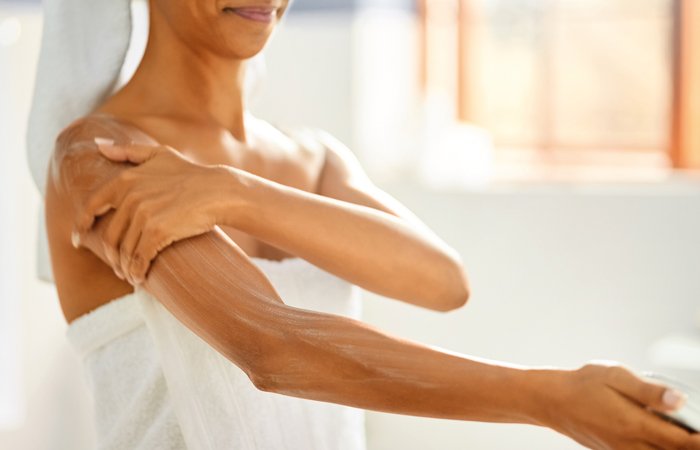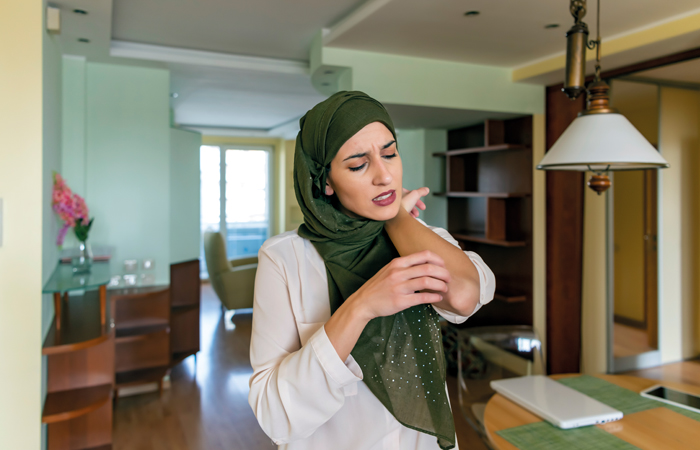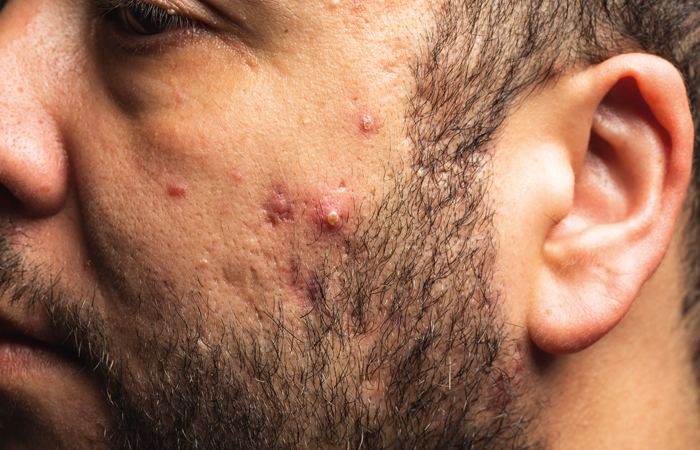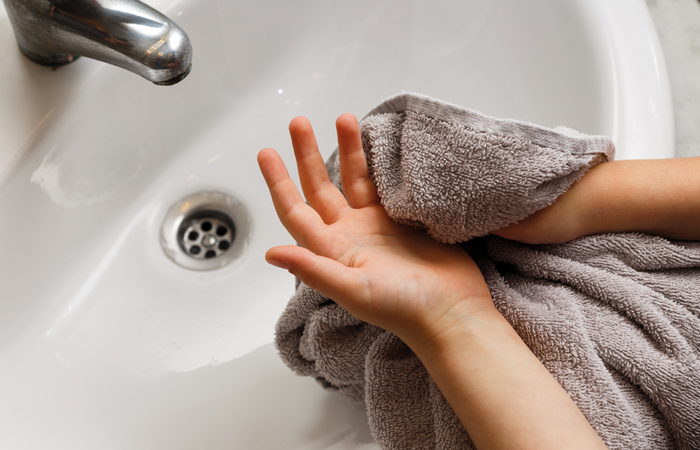Skincare and mental health
In OTC
Follow this topic
Bookmark
Record learning outcomes
At surface level, wanting to treat skin conditions may seem purely aesthetic, when in reality their impact goes much deeper. Find out how skin problems are taking their toll on mental wellbeing and what pharmacy can do to help
Skin disease is not just a physical issue. It can affect all aspects of people’s lives, from schooling, relationships, self-esteem and career choices to social, sexual and leisure activities. It can also lead to feelings of isolation, embarrassment, shame, depression and anxiety, which is why psychological interventions should be an important aspect of managing skin conditions in the long-term.

Yet, in September 2020, an All-Party Parliamentary Group on Skin (APPGS) report entitled ‘Mental Health and Skin Disease’, revealed a worrying lack of mental health support for people with skin disease. Over half of the patients surveyed did not know that specialist support in the form of psychodermatology was even available for them. As for children with skin disease, they are not usually offered support services at all, which can have a profound impact on their long-term mental health, life course and wellbeing into adulthood.
“In the recent APPGS survey of patients with skin conditions, 98 per cent of participants felt that their skin condition had affected their emotional and psychological wellbeing at some point,” says Dr Penelope Pratsou, consultant dermatologist and British Skin Foundation spokesperson. “Some 93 per cent reported that their skin condition affected their self-esteem, with five per cent reporting thoughts of hopelessness and suicidal ideation. This huge psycho-social impact is quite often underestimated by clinicians and other healthcare professionals, who may trivialise or view skin conditions as a minor or even cosmetic issue.”
Indeed, a National Eczema Society survey in September 2020 revealed that over half of adults and 40 per cent of children had never been offered an emotional or psychological support service by an NHS doctor to help them cope with the mental health impact of their eczema.
Around a quarter of the UK population consult a GP each year for a skin complaint
Management advice
Around a quarter of the UK population consult a GP each year for a skin complaint, the most common being inflammatory skin diseases such as eczema, psoriasis and acne, and many of these cases can be managed in primary care. Yet according to the APPGS report, many primary healthcare professionals, including nurses and pharmacists, don’t have access to training in dermatology, and even fewer are trained in psychodermatology to help deal with the psychological impact of these conditions on patients. If primary healthcare professionals don’t have the skills to make a psychological assessment, they may miss key signs of distress.
Dr Pratsou says that if anyone visiting a pharmacy is struggling with their mental health as a result of their skin, the pharmacy team should encourage them to seek medical help. “As a starting point, identifying someone in distress can consist of simply asking how their condition is affecting their lives, how it makes them feel, and listening to the response,” she explains. “Demonstrating empathy, and an understanding of the tremendous impact skin conditions can have on mental health, can allow people to open up about their own mental health concerns and allow pharmacy teams to signpost them to appropriate resources and support.”
Helpful management strategies for psychological symptoms include peer support, mindfulness to reduce stress, habit reversal and cognitive behavioural therapy (CBT). Organisations and charities, such as the British Association of Dermatologists, British Skin Foundation and National Eczema Society, can provide help, advice and signposting. Some people with skin conditions may benefit from learning more about what triggers their flare-ups and how to keep their symptoms under control with self-management interventions, coping strategies and effective treatments.
The pharmacy team may be able to help people find the right product for their skin condition, but should also know when to refer them to a GP if necessary. “Any patient with psoriasis, eczema, rosacea and acne who has moderate or severe disease, scarring acne or persistent flare-ups despite OTC pharmacy treatments should be referred back to their GP or advised to see a dermatologist,” Dr Pratsou recommends. “Importantly, patients with these skin conditions are more likely to experience anxiety, depression, poor self-image and difficult social interactions as a result of their skin. So, referral back to their doctor, even in the absence of moderate to severe skin disease, is equally crucial.”
Barrier breakdown
Eczema can affect people of all ages. The most common form, atopic eczema, affects one in five children and one in 12 adults in the UK. It can cause very itchy skin that may also be red, cracked and sore. Eczema is thought to be caused by a breakdown in the skin’s natural protective barrier – this may be due to a combination of genetic and environmental factors, making the skin more susceptible to itching, irritation and infections.
Keeping the skin moisturised with rich emollients is the first-line management approach. Identifying and controlling known triggers, such as allergies, weather changes, household chemicals and clothing, is also important.
Dr Pratsou says it may help to simplify eczema treatment using a three-step approach:
- Avoidance of soap in the shower or bath. “There are a number of bath additives and soap substitutes readily available for patients with eczema that reduce skin dryness and irritation,” explains Dr Pratsou
- Use of a regular bland emollient, at least twice daily, applied liberally on the whole skin. “Often 250-500g per week is required,” advises Dr Pratsou. “Creams, gels and ointments that are fragrance free and specifically formulated for eczema are recommended, while lotions are not as useful. There is no current evidence that one bland emollient is better than another, and therefore the best one is one that patients like to apply and will stick to using”
- Use of a topical steroid (or calcineurin inhibitor) may be needed to tackle any flare ups. “The potency of these will need to be determined by the patient’s GP or dermatologist,” says Dr Pratsou. “However, patients are often unsure about how much topical steroid they should safely apply. Education by the pharmacist on how much steroid they should be applying, using the model of the fingertip unit application, would be extremely useful.”
If a pharmacy customer has regular persistent flare ups, they should be referred back to their GP or dermatologist. More severe cases may require other prescribed treatments, such as phototherapy, oral steroids, oral immunosuppressant drugs and a biologic drug. Complete the CPD module on managing childhood atopic eczema for more.

Scaling up the problem
Psoriasis affects around one in 50 people and can appear at any age. It occurs when skin cells are replaced more quickly than usual, possibly due to a problem with the immune system. The affected skin has pink or red patches with silvery-white scales. Flare ups may be triggered by infections, stress, alcohol, intense sunlight and some medicines such as beta blockers, lithium and antimalarials.
Psoriasis can affect the skin on many parts of the body and may affect the nails and joints too. The treatment depends on the psoriasis type and severity. Mild to moderate psoriasis may be treated with topical creams, ointments, gels and lotions. More severe or extensive cases may need ultraviolet treatment (phototherapy), tablets or injections. Patients with psoriatic arthritis will usually be referred to a rheumatologist as well.
“Topical emollients can be used to soften the scaling on various body sites,” says Dr Pratsou. “This, in some cases, allows the more active treatments to penetrate and treat inflamed skin. Over-the-counter tar-based shampoos can be really useful for scalp psoriasis. Psoriasis can flare up in periods of physical and emotional stress, as well as with moderate to large amounts of alcohol intake, and can improve with weight loss in those who are overweight. Advice on lifestyle measures, such as limiting alcohol and losing weight, is therefore important”.

Rescuing rosacea
Rosacea affects around one in 10 people in the UK, especially those in middle age, and is more common in women and people with lighter skin. It can cause redness (blushing) on the nose, cheeks, forehead and chin, due to dilated blood vessels. Some people also get small pink or red bumps and pus-filled spots, similar to acne, and a burning or stinging feeling when using water or skincare products. Around half of people with rosacea also have dry, burning or itchy eyes.
Self care measures may help to keep the symptoms under control. “Rosacea sufferers tend to have quite sensitive skin that is prone to irritation,” says Dr Pratsou. “It’s best to look for a gentle skin cleanser and simple facial moisturiser formulated for sensitive and/or rosacea-prone skin. Active ingredients that are helpful for rosacea include azelaic acid and niacinamide. It is important to add one active ingredient at a time to avoid problems with irritation and skin sensitivity.”
Rosacea flare-ups are more likely to be triggered by lifestyle factors than in acne. “Around 85-90 per cent of rosacea is photosensitive, so advising [customers to use] a dedicated daily sunblock – SPF 30 to SPF 50 with good UVA protection – is key,” Dr Pratsou explains. “Other lifestyle triggers include alcohol, caffeine and spicy foods, but not all patients are affected similarly.”
More severe rosacea may be treated with a course of topical or oral antibiotics, although specialist clinics may offer other treatments, such as light or laser therapy, as well.
Rosacea flare-ups are more likely to be triggered by lifestyle factors than in acne

Addressing acne
Acne affects most people at some point, causing spots, cysts and oily skin, especially on the face, back and chest. It’s more common in teenagers, but can affect adults too. Acne is usually triggered by hormonal changes including periods, pregnancy and the menopause, but also by some medicines (e.g. corticosteroids) and pressure from clothing on the skin (e.g. headbands or masks).
Acne is caused by an overproduction of oily sebum by the sebaceous glands, which are found near the surface of the skin attached to hair follicles. The sebum mixes with dead skin cells and blocks the hair follicles, which can lead to the formation of blackheads and whiteheads. A usually harmless skin bacterium feeds on the dead skin cells and sebum, causing inflamed spots.
Acne should be treated as soon as possible to stop it getting worse and to avoid scarring. A good skincare routine is important. “When advising on skincare, non-comedogenic products are best, as other heavy preparations can sometimes result in breakouts,” says Dr Pratsou. “Leading a healthy lifestyle is good for healthy skin, but we currently don’t have enough evidence to suggest a particular diet or regime for every acne patient.”
OTC acne treatments may treat mild teenage acne and/or adults with the odd breakout. Most of these treatments take time to work, often up to 12 weeks, and customers may need to try several products to find the right one for them.
“Pharmacy teams can help acne sufferers by suggesting treatments according to the specific type of acne,” says Dr Pratsou. “For example, papules (tiny, raised bumps on the skin) and pustules (pus-filled spots) may be helped by using benzoyl peroxide or salicylic acid on a regular basis. Comedones (blackheads and whiteheads) may benefit from retinol-containing products as well. Other useful ingredients to look for are glycolic acid, niacinamide and tea tree oil. Despite the fact that there are many useful ingredients, avoid using too many actives together as this can dry out and irritate the skin.”
If customers have moderate, severe or scarring acne, or their skin is affecting their mental health, they should be referred to their GP for prescribed topical or oral medicines, including antibiotics, oral contraceptives and retinoids, as well as discussions about other potential methods of management.
Skin problems and Covid-19

Soap is more effective than emollient soap substitutes at washing Covid-19 off the skin, but regular handwashing with soap has led to an increase in skin problems during the Covid-19 pandemic. According to the National Eczema Society in August 2020, one in four children were suffering from hand eczema due to increased handwashing. Additionally, 38 per cent of children reported dry skin and 17 per cent were suffering with cracked skin, while six per cent were experiencing the distress and pain of bleeding hands.
It’s essential that anyone prone to dry skin still follows the Government’s advice on Covid-19 prevention, but there are also things they can do to keep hand eczema at bay. “Keeping hands clean is a key part in the fight against Covid-19,” says Dr Paula Beattie, dermatologist at the Royal Hospital for Children in Glasgow and British Skin Foundation spokesperson. “Although it’s concerning to hear of children suffering with skin problems due to frequent handwashing, thankfully this can be alleviated with the regular use of an unfragranced moisturiser. Encourage children to get into the routine of moisturising after every hand wash.”
People with eczema should also be advised to:
• Apply their usual emollient after using a hand sanitiser to minimise any irritant effect
• Gently pat their hands dry after washing, rather than rubbing them
• Take special care to dry between the fingers where the skin is more prone to dryness and cracking – this will also remove the build-up of soap residue
• Rehydrate sore dry hands overnight using an ointment and wearing clean, cotton gloves
• Wear nitrile gloves when handling detergents or other cleaning products that can irritate the skin.
If pharmacy customers find their hand eczema is getting worse, or suspect their skin is infected, they should contact their GP as they may need prescription medicines to help ease it.
